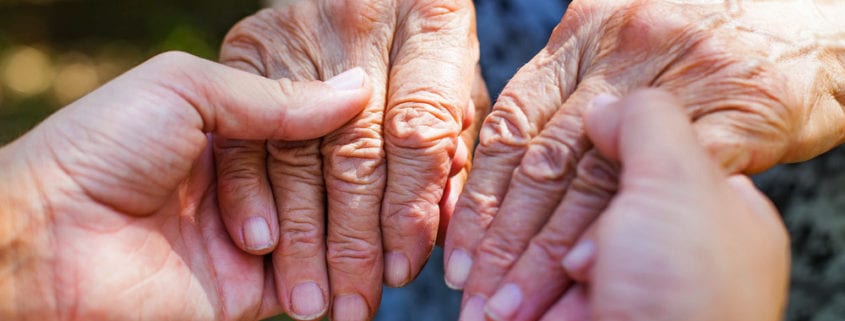Dementia Stoma Care
By R.S. Elvey
Caring for an ostomy can often be a frustrating and challenging experience at any age. But combine advanced age and dementia and it becomes even more of a challenge for caregivers and loved ones. According to the Population Reference Bureau, the number of Americans 65 and older will gradually increase from 15% of our population to 24% by 2050. With this growth has come a rise in existing and new ostomies combined with Alzheimer’s or other dementias. The Alzheimer’s Association of America reports in their 2017 Alzheimer’s Disease Facts and Figures report, “Of the estimated 5.5 million Americans with Alzheimer’s dementia in 2017, 5.3 million are age 65 and older.” The association predicts a half a million new cases of Alzheimer’s dementia will develop annually.
This explosive growth in new cases of dementia is putting an enormous strain on family caregivers. The Family Caregiver Alliance estimates, “44 million Americans age 18 and older provide unpaid assistance and support to older people and adults with disabilities who live in the community.” These caregivers often have little or no preparation or support in providing care for people with disabilities such as stoma care. They become frustrated and worn out. In an online forum, an anonymous writer expressed her frustration about caring for her mother’s stoma as follows, “I am TIRED of it. I need someone to take over dealing with an ostomy and ordering the correct supplies for her, etc… And I am just going to make whatever decisions seem right regarding her bladder care, as I find out more info. I really wanted to yell at her tonight and that makes me feel like a terrible, awful person. I didn’t, but I did get a little firm.”
Studies have shown that family caregivers who provide care to family members with chronic and disabling conditions are also putting themselves at risk of developing emotional and physical health problems. When seeking stoma care information, caregivers often participate in online chat rooms and forums for anecdotal advice. Additionally, visiting nurses with wound and ostomy training often make home visits and teach ostomy care. But when they leave the caregiver is often faced with ever-changing challenges as their loved one’s dementia worsens. Most often they face the challenge of not knowing when a pouch needs to be emptied, appliances being ripped off by their loved one or attempts to empty and change the appliance that miss the mark and require massive cleanups.
Realizing the complexity of stoma care and dementia and the pressure it causes to caregivers, the Colostomy Association of the United Kingdom and the Dementia Association of the United Kingdom combined to issue a twelve-page downloadable leaflet at www.dementiauk.org entitled, “Caring for a person with a stoma and dementia”. They readily recognize that not all persons with dementia will profit from learning to care for their stoma. But where it is possible a person should be encouraged to participate in their own stoma maintenance.
The leaflet’s content is based on input from health professionals who care for ostomates with dementia and a stoma. A few of the hints and tips included in the publication are:
- “People with dementia who are actively involved in changing their bags should be encouraged to wear gloves. This reduces the risk of infection, feces under the nails and fecal spreading.”
- “Some people with dementia who require their bag to be changed for them might resist. In these cases distraction could help. For instance, encouraging the person to clean their teeth or brush their hair during the process might be helpful. Standing the person in front of a mirror so they can focus on the task they are performing and not the bag change can help.”
- “Bag choice is important. One-piece bags with pre-cut aperture have the advantage of being uncomplicated for both person and caregiver. Two-piece bags, where the flange can remain in situ for up to three days, helps protect the skin where frequent changes are necessary.”
Individual and professional caregivers also provide additional advice based on their experiences. Many staff who work in nursing homes put a plastic bag over the pouch so that in case of any leakage, there won’t be a much larger incident. Many persons with Alzheimer’s or other dementias either pick or rip off their pouches. To prevent this from happening, many caregivers dress their loved ones in special clothing that has no openings in the front but still gives the appearance of normal clothing. One source for this type of clothing is Buck and Buck. Their online catalogue features adaptive clothing by gender and condition. Lastly, in this smartphone age there is even an app that might help. 11 Health has created the Alfred Alert Sensor. The sensor is applied to the pouch at a point where it should be emptied. When that point is reached it connects by Bluetooth wireless technology to the Alfred Alert app on your smartphone to tell you it is time to empty. The app can also capture patient output volume over a period of time. The data is stored in a HIPAA compliant cloud server where it can be shared by medical professionals and family members.
In the final analysis, caring for a loved one with dementia is a joint effort between the person with dementia, their loved ones, their medical consultants and other professional caregivers.
Editor’s note: UOAA Affiliated Support Groups all around the United States are open to ostomy and continent diversion patients, caregivers, family, and friends.












My mother has Demetria and she pulls the bag off constantly. I don’t know what to do. She is in a nursing home. And they are trying their best but we are all frustrated.
Hi Diana,
Sorry to hear that. My grandmother is going through the same situation with my grandfather. I wanted to know if you had received any advice, on what could be helpful in that situation. What can you do in order to avoid him from pulling his ostomy bags?
Has anyone come up with ideas on how to keep your loved one from ripping off the bag. My Mom has dementia and when she goes to the bathroom to poop she sits there and picks at the bag. She often has diarrhea, so she is in there a lot. We just put her in a memory care facility and we have no answers Any help would be appreciated.
Thank you
Im going through the same thing. I’ve spent exhaustive amount of time looking for some tips. My dad pulls his off and their apt smells like urinie and the facility they live in complains of the amount of laundry he produces. They are talking of moving him from assisted living to memory care where he can be moitored 24/7 but I dont feel he’s at this level of care at this point. I don’t know what to do. It breaks my heart
Is there a cover or a way my Mom can not rip it off she has dementia and is always pulling it off in the night and tonight when she was awake took it off.
Is there a thing I can strap around her for not to be able to get to it.. help please.. the poop mess is real in the morning.. I need something to help her not rip it off..Help ease
Adaptive clothing for dementia patient’s can really help. Jumpsuits that zip up the back can prevent them from accessing the bag.
My husband’s 75 and I never know when he’s going to take his appliance off. We sometimes have poop everywhere, His bed the floors the wall. Alzheimer’s is horrible. He tells me it’s not his! I have no help. We don’t qualify for medicad but our income doesn’t allow for help. Some days, I wish I could just run away! Most places to get help from require you to use 6 or mor hours a day at least 5 days a week. I just want someone 2 half days a week. And or if I need to be out for a few hours. I haven’t had a mammogram since before Covid. I not going for any dr appointments for myself. I can’t trust him more than a short period. I’m really tired.